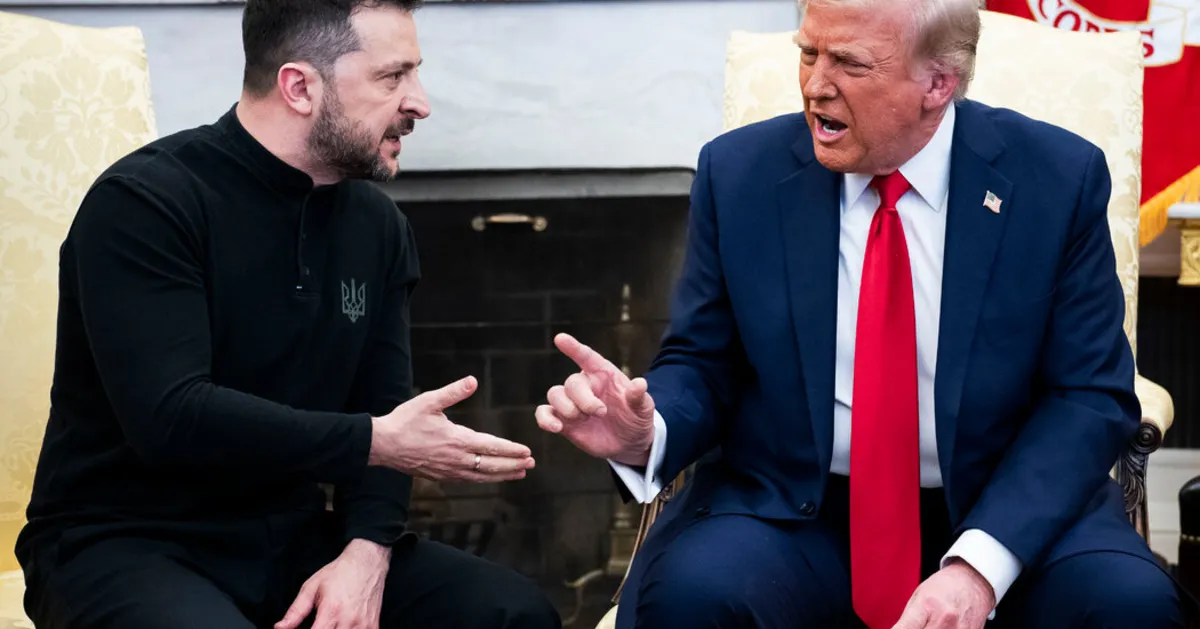
In a dramatic turn of events, former President Donald Trump threatened to completely abandon support for Ukraine during a heated meeting with Ukrainian President Volodymyr Zelensky. The confrontation escalated quickly, leading to the cancellation of planned events, including a joint news conference and a signing ceremony for a vital minerals deal. The fallout left many wondering about the future of U.S.-Ukraine relations and provided a significant advantage to Vladimir Putin, as he aims to exacerbate tensions between Ukraine and its primary ally, the United States.
After journalists were escorted from the Oval Office, President Trump expressed his frustration with President Zelensky, stating on social media that he believed Zelensky was not prepared for peace negotiations while relying on U.S. support. “I want peace, not advantage,” Trump wrote, highlighting his dissatisfaction with Zelensky's approach during their meeting. The scene was unprecedented, with Trump openly scolding a visiting leader from a nation currently facing invasion.
Following the tense exchange, Senator Lindsey Graham, a close ally of Trump, suggested that President Zelensky should either resign or significantly change his approach to governance. “He either needs to resign and send somebody over that we can do business with or he needs to change,” Graham stated, intensifying the uncertainty surrounding Ukraine's leadership amid ongoing conflict.
Trump's outburst highlighted a stark contrast between his treatment of Zelensky and his ongoing admiration for Putin. While Trump vented his anger at the Ukrainian leader, he simultaneously expressed solidarity with Putin, recalling their shared experiences during investigations related to Russian interference in the 2016 election. This incident raises questions about the stability and reliability of U.S. support for Ukraine during its time of crisis.
During the meeting, Zelensky attempted to articulate the complex history of the conflict with Russia, pointing out that tensions date back to 2014 when Crimea was annexed. He expressed skepticism regarding the peace efforts proposed by Trump's ally, JD Vance, who accused Zelensky of disrespecting the U.S. by discussing the war in front of the media. Vance's aggressive stance left many observers questioning whether this confrontation was a premeditated ambush, particularly given his previous indifference towards Ukraine's plight.
The Oval Office meeting was intended to finalize a minerals deal that would serve as repayment for U.S. military aid to Ukraine. However, the fallout from the confrontation has left the future of this agreement in jeopardy. Just days earlier, Trump had seemed willing to cooperate with Zelensky, even downplaying previous derogatory comments about him.
The public and political backlash following the meeting was swift. Senator Amy Klobuchar was among those who criticized Trump's tone, emphasizing that Zelensky has repeatedly expressed gratitude for U.S. support, both publicly and privately. “Zelenskyy has thanked our country over and over again,” Klobuchar tweeted, highlighting the importance of supporting Ukraine against Russian aggression.
The tension-filled meeting between Trump and Zelensky marks a pivotal moment for U.S.-Ukraine relations, casting doubt on the future of military and economic support for Ukraine. As the world watches, the implications of this confrontation may reverberate through international politics, influencing not only the fate of Ukraine but also the broader geopolitical landscape. With Trump’s unpredictable behavior and the ongoing conflict in Ukraine, the need for a stable and supportive U.S. stance has never been more critical.